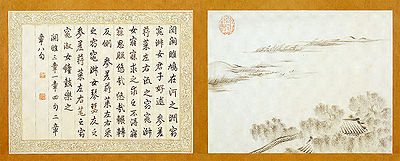Book of Songs (Chinese)

The first song of the Classic of Poetry, handwritten by the Qianlong Emperor, with accompanying painting.
|
|
| Original title | 詩 |
|---|---|
| Country | Zhou dynasty |
| Language | Old Chinese |
| Subject | Ancient Chinese poetry and song |
| Published | c. 600 BC |
| Classic of Poetry | |||||||||||||||||||||||||||||||||||

"Classic of Poetry" in seal script (top), Traditional (middle), and Simplified (bottom) Chinese characters
|
|||||||||||||||||||||||||||||||||||
| Traditional Chinese | |||||||||||||||||||||||||||||||||||
|---|---|---|---|---|---|---|---|---|---|---|---|---|---|---|---|---|---|---|---|---|---|---|---|---|---|---|---|---|---|---|---|---|---|---|---|
| Simplified Chinese | |||||||||||||||||||||||||||||||||||
|
|||||||||||||||||||||||||||||||||||
| Transcriptions | |
|---|---|
| Standard Mandarin | |
| Hanyu Pinyin | Shījīng |
| Gwoyeu Romatzyh | Shyjing |
| Wade–Giles | Shih1-ching1 |
| IPA | [ʂɨ́.tɕíŋ] |
| Wu | |
| Romanization | Sy-chin |
| Yue: Cantonese | |
| Yale Romanization | Sī-gīng |
| Jyutping | Si1-ging1 |
| Southern Min | |
| Hokkien POJ | Si-king |
| Middle Chinese | |
| Middle Chinese | shi-keng |
| Old Chinese | |
| Baxter-Sagart | *s.tə (k-lˤeng) |
The Classic of Poetry, also Shijing or Shih-ching, translated variously as the Book of Songs, Book of Odes, or simply known as the Odes or Poetry (Chinese: 詩; pinyin: Shī) is the oldest existing collection of Chinese poetry, comprising 305 works dating from the 11th to 7th centuries BC. It is one of the "Five Classics" traditionally said to have been compiled by Confucius, and has been studied and memorized by scholars in China and neighboring countries over two millennia. Since the Qing dynasty, its rhyme patterns have also been analysed in the study of Old Chinese phonology.
Early references refer to the anthology as the 300 Poems (shi), with a typically inexact use of "three hundred".The Odes first became known as a jīng, or a "classic book", in the canonical sense, as part of the Han Dynasty official adoption of Confucianism as the guiding principles of Chinese society. The same word shi later became a generic term for poetry. In English, lacking an exact equivalent for the Chinese, the translation of the word shi in this regard is generally as "poem", "song", or "ode". Before its elevation as a canonical classic, the Classic of Poetry (Shi jing) was known as the Three Hundred Songs or the Songs.
The Classic of Poetry contains the oldest chronologically authenticated Chinese poems. The majority of the Odes date to the Western Zhou period (1046–771 BC). A final section of 5 "Eulogies of Shang" purports to be ritual songs of the Shang Dynasty as handed down by their descendents in the state of Song, but is generally considered quite late in date. According to the Eastern Han scholar Zheng Xuan, the latest material in the Shijing was the song "Tree-stump Grove" (株林) in the "Odes of Chen", dated to the middle of the Spring and Autumn period (c. 700 BC).
...
Wikipedia
